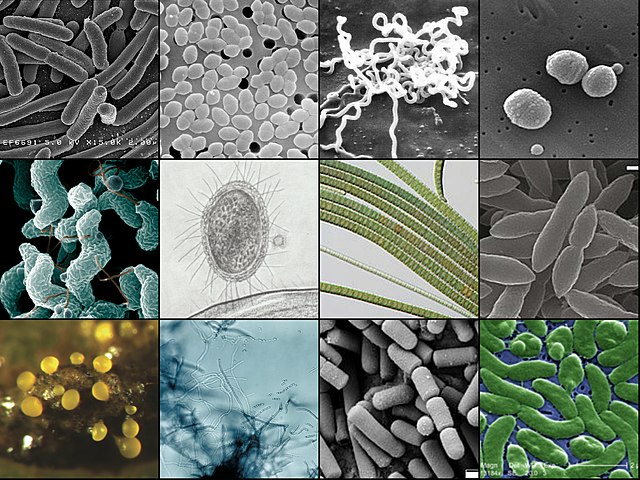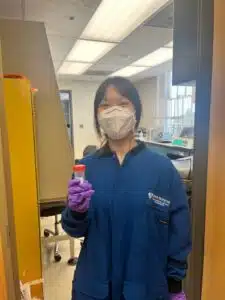
From Plastic-Eating Bacteria to Oil-Eating Fungi: Evolution’s Tiny Environmental Heroes
February 15, 2023By Emily Xing, 2023 Future Blue Youth Council member
Last summer in a research lab, I threw some fungi into a flask full of motor oil. And it grew. The idea was ridiculous, but with no other food, it successfully decomposed the petroleum into food, recycling it into non-toxic substances. See, these fungi may actually be promising solutions to oil spills for centuries to come.
 Today’s ecosystems face terrible threats: climate change, global warming, industrial pollution. On March 24, 1989, the Exxon Valdez oil spill leaked 11 million gallons of petroleum into our seas, and, while devastating, this event sparked a never-before-seen global interest in watershed protection. We’ve come to realize that such pollution poisons marine habitats and suffocates wildlife (see FBYC member Ariana Piscoya’s article, “Oil Spills: A Silent Enemy”). The scientific world has since raced to develop efficient clean-up techniques—like bioremediation.
Today’s ecosystems face terrible threats: climate change, global warming, industrial pollution. On March 24, 1989, the Exxon Valdez oil spill leaked 11 million gallons of petroleum into our seas, and, while devastating, this event sparked a never-before-seen global interest in watershed protection. We’ve come to realize that such pollution poisons marine habitats and suffocates wildlife (see FBYC member Ariana Piscoya’s article, “Oil Spills: A Silent Enemy”). The scientific world has since raced to develop efficient clean-up techniques—like bioremediation.
Bioremediation is the usage of live organisms to break down environmental pollutants. Earth’s marvelous myriad of biodiversity offer novel solutions to age-old problems; for instance, within plastic landfills in 2016, Japanese scientists discovered a bacteria that decomposes polyethylene terephthalate (PET), the most common plastic. Ideonella sakaiensis can consume a plastic bottle in under 24 hours, compared with the 450+ years it normally takes for PET to break down!
It was one of the fastest evolutionary responses to our environmental destruction that scientists had ever seen; PET products have only been around for 50 years, and yet Ideonella sakainesis had already incorporated them as nutrient sources. Through genetic engineering, researchers have been working to make Ideonella sakaiensis more effective, such as being able to decompose polyethylene furanoate (PEF) as well!
And beyond plastic-eating bacteria, evolution has instilled us with heavy-metal-accumulating plants, oil-spill-eating fungi, and many more wondrous creatures! In my lab, I worked with wild-type Aspergillus fungi, which was found degrading crude oil in Gulf of Mexico soils after the largest oil spill in history. We wanted to see if it would grow directly in water instead of land, and it did! After 12 days, the Aspergillus consumed all of the glycerol (a major biofuel production by-product) we had given it, and it even began to grow in the motor oil flask. Who knew that the decade-old motor oil bottle my mentor refused to throw away would actually come to use?

Bioremediation clean-up methods are healthier compared to industrial technology because they are all-natural. Rather than utilizing invasive techniques like dispersants, which introduce foreign toxins, organisms decompose the oil into safer, biodegradable substances. There are some obstacles, though, before bioremediation can be largely implemented: Its rates vary largely by organism used, concentration and type of pollutant, and environmental conditions, among other factors scientists are working to standardize.
Still, bioremediation is not the best solution because we can’t rely on evolution to solve our pressing environmental crisis. More than 380 million tons of plastic waste, 50 billion tons of greenhouse gasses, and 1.2 trillion gallons of industrial water waste are produced every year. While bioremediators can help us fight climate change, the biggest steps towards a brighter future must come from us, the civil actions we take, and corporate accountability we demand.
Science is a product of humanity, and one of our greatest gifts is the capacity to think and innovate. But I also think that it’s more important, now than ever, to recognize that nature is full of innovation, too. Bacteria that cunningly made food out of plastic, fungi that cleverly fed off the petroleum we spill—really, these creatures are just like us. We’re all trying to make the best of our time on Earth; so let’s work together in protecting it.
